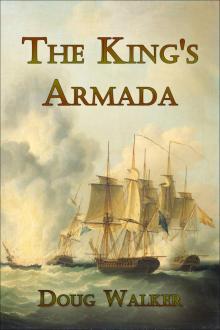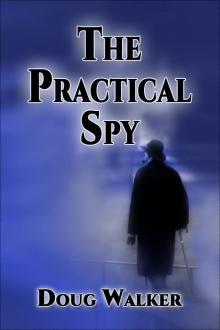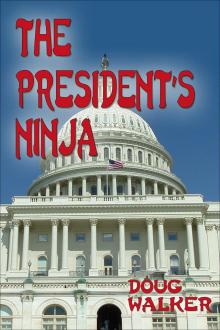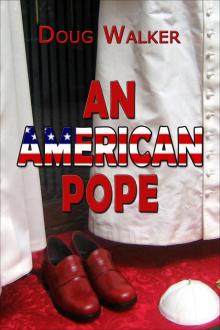- Home
- Doug Walker
The King's Armada
The King's Armada Read online
THE KING’S ARMADA
Copyright 2013 Doug Walker
Cover Image:
CHAPTER ONE
Dust and the heavy smell of horses. Lieutenant Hidalgo stirred in his chair and eyed the man on the bench across the room, the man who claimed to be Lieutenant Pedro García, the man who sat with a small animal he claimed was a dog in his lap. “I will tell the captain,” Hidalgo finally said. He rose heavily to his feet, head pounding from too much partying last night, even though the new evening was rapidly approaching.
“There is a man who says he is Lieutenant Pedro García from the Presidio of Bilbao. He wishes to speak to you about matters of great importance.” Hidalgo hesitated, then added, “He says.” The captain’s office was small, but well appointed. A crucifix decorated one wall, crossed swords another. Double doors opened to a balcony behind his comfortable chair. A terra cotta wine decanter and four small glasses stood within easy reach.
“You have reason not to believe him?” Captain Delgado asked. Contrasted with Hidalgo, the captain appeared fresh and crisp. It did not add to Hidalgo’s dragging spirits to know the captain had just completed a two-hour siesta followed by a bath and a change of uniform.
“He has a small animal he says is a dog. To carry such a beast does not inspire confidence. He has no papers, yet he says he is an officer of the King.”
“There are exotic animals of all sizes in Africa,” the captain remarked. “Whatever, send him over.”
“Yes, Sir.”
As he reached the door, the captain said, “You look a mess, Hidalgo. Get the corporal to relieve you. Take a nap and try not to drink so much tonight.”
“As you wish, Sir.” The lieutenant almost shrugged, but thought better of it. Drinking and carousing was a soldier’s life. A common soldier at 18, a sergeant at 25, an officer at 30 for an act of bravery, Hidalgo had little hope of further advancement at this drab post, or elsewhere.
Sure enough, Pedro García carried a small dog when he entered the captain’s office. It was difficult, but he attempted to snap to attention and salute with the dog under an arm. The dog, which Pedro called Poncho, was as confused as Hidalgo had been. After all, they had arrived in Bilbao under odd circumstances and it had not been without considerable trouble that a suitable horse had been found. There followed the long ride to Santander.
“I am Lieutenant Pedro García, late of Bilbao, at your service, Sir.”
Hidalgo had been right. Not only the small, odd animal, but García’s speech, although perfect Spanish, and his attire, although the perfect uniform for a King’s officer, seemed unusual. “And to what do I owe this honor?” the captain inquired.
“I am on a mission of grave importance. I carry intelligence of the English brought to Bilbao at great risk.”
The captain smiled. “Sit down, lieutenant, and tell me who took this great risk.”
A spy, Sir. A devoted Catholic, a patriot of Spain.” García attempted to mold his face into a grim mask.
“Tell me, are we about to be fallen upon by the English heretics, do their fleets approach our coast, is an invasion in the cards?” His tone was light, but not without respect as he continued to size up this stranger.
“No, Sir. My message is more general.” García, not much over thirty and with black hair that tended to curl slightly and the dark intelligent eyes, settled into his chair and placed the dog on the floor. “His name is Poncho.” He motioned toward the animal.
The dog knew well that his name was Pierre and wondered why his master now called him Poncho. The confusion mounted in the canine head, a head inclined toward logical thought. Logical thought, yes, but inside that small head was a mischievous spirit of adventure, and the dog was imagining that the stage was set and the show was about to begin.
The captain nodded and smiled slightly. The animal had eyes like dark marbles, partially obscured by hair. There was a lively intelligence about him, this Poncho. “I do not see a dispatch case. Have you left it in the care of your horse?”
“No, Captain. My report is in my head. I stop here on a courtesy call and, if at all possible, could you spare a couple of troopers to accompany me to Madrid?”
“Are there no troops in Bilbao?”
“Sad, but true. There has been sickness there and recruiting problems. Bilbao is undermanned.”
It was an old story and probably true. But there was something bizarre about this young lieutenant and Poncho. The captain’s mind was quick, and he had hit upon his answer instantly, but he would wait.
“We will dine together, and in the morning we will see what we will see.”
García rose, snapped to attention, saluted, then picked up his dog.
“You must bathe and nap before dinner. Your journey has been long. My man will show you to the facilities.”
Morning came too early. A servant woke García at first light. The evening with Captain Delgado had been of great interest, a lesson in current events, many trivial items that García knew nothing of, plus the great topics that kept all of Europe abuzz. They talked of Spain’s near bankruptcy despite the masses of gold and silver pouring in from the New World, of the English corsairs that preyed on the treasure ships, and of King Felipe II and how Spain stood as a world leader in this year, 1586. In his younger years on the throne, the king had acted with the patience and reserve of an older man. Now as an older man, he was showing the audacity and risk taking of the very young.
In turn, García told the captain about his younger life, much of it spent in splendid isolation. He had also pulled a document from his tunic for the captain’s examination, a document that linked García with one of the noblest of Spanish families, a document that would have permitted him to use the title of “Don” if he had so chosen. The importance of family was not lost on Captain Delgado.
Following a solitary breakfast of eggs, ham and fried bread, Delgado appeared accompanied by Lieutenant Hidalgo, both men looking well rested and in crisp attire.
“You will have your two troopers,” the captain announced. “And I have prevailed upon the lieutenant to accompany you as well. It has been years since he has seen Madrid.”
Poncho, aka Pierre, who was wrestling the last shred of meat from a hambone while seated in a chair beside his master, pricked up his ears. Here was something of interest that held the possibility of evil. He had distrusted Lieutenant Hidalgo at first sight. Call it canine instinct, but there it was, a first warning. Not that the small Yorkie had any knowledge of his master’s total plan.
“Very good,” García responded, “Can we leave at once?”
“Even as we speak,” the captain smiled, “horses are being saddled and a pack animal prepared. You will be in Madrid in only a matter of days.”
From Santander, set by the Bay of Biscay, there was a fair road leading almost directly south to Madrid. Many hamlets dotted the road along the trip, but only one city of any proportion, Burgos, stood on the major crossroads between Miranda de Ebro and Valladolid. The only geographic barrier was a mountain range just north of Madrid.
And so the four of them rode south enjoying the fine weather, the two lieutenants and the two troopers, chatting and bonding as the days passed. The dog, ever present, listened and learned, grasping his master’s overall intent, but unable to discern the final objective.
A high point for García was reaching the Camino de Santiago, the pilgrim’s trail that ran from St.-Jean-Pied-de-Port in the French Pyrenees for 500 miles to the northern Spanish city of Santiago. Pilgrims seeking religious points have trod the trail since the ninth century when the burial place of St. James the Apostle was said to have been discovered in a Roman-era tomb.
They took shelter in one of the many refugios along the pat
h, this one adjoining a Benedictine convent. That afternoon menacing Griffon vultures with eight-foot wingspans circled the four travelers for more than an hour causing one of the troopers to frequently glance skyward and cross himself. He was the one named Jesus, a short sturdy man with what appeared to be one bad eye, although he never seemed to lack for sight. When not menaced by giant birds he had a ready smile and quick wit. García took an instant liking to him, taking him to be a man who would stand by you in a tight spot. He would get to know Jesus better as the days passed into weeks.
It was just after sighting the Griffons, possibly triggered by those great birds who brought a spiritual quality to the march, that Pedro had a moment of truth, or a moment of fear, call it what you will, but a sudden chill, a feeling of complete loneliness in an alien world at a time in history he did not fully understand.
But one could say he understood it more than anyone alive in Spain on that lovely day, in that epic era. You see, this was García the time traveler, a man who had stumbled across a formula to move from the 21st Century back to the late 1500s.
A persistent nagging thought was, “Can I do anything to change history, and, if so, do I want to?”
As a boy García had learned Spanish from his mother who taught it in high school. In their youth both parents had been hippie types who had traveled in a flower painted VW bus throughout Mexico and the U.S. southwest. Growing up, García (not his real name) had spent long, dreamy vacations in Oaxaca and Isla Mujeres in Mexico, plus other destinations south.
It was only natural that García, after a hitch in the Marines, had become both a Spanish and history major, with a doctorate in Spanish history. During his studies and vacations he often found himself in Spain. During one of these outings he discovered time travel documents in a long forgotten, dusty Spanish archive. Did he copy them? No. Although generally honest and ethical, he shoved the documents inside his shirt and walked off.
His prime fascination as a scholar and an adventurer was with that greatest adventure, the Spanish Armada.

 The King's Armada
The King's Armada The Seventh Samurai
The Seventh Samurai The Practical Spy
The Practical Spy The President's Ninja
The President's Ninja The Good Deed
The Good Deed An American Pope
An American Pope